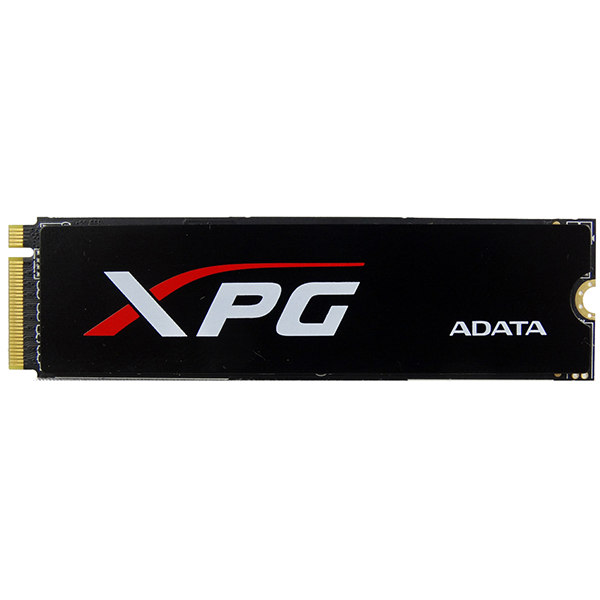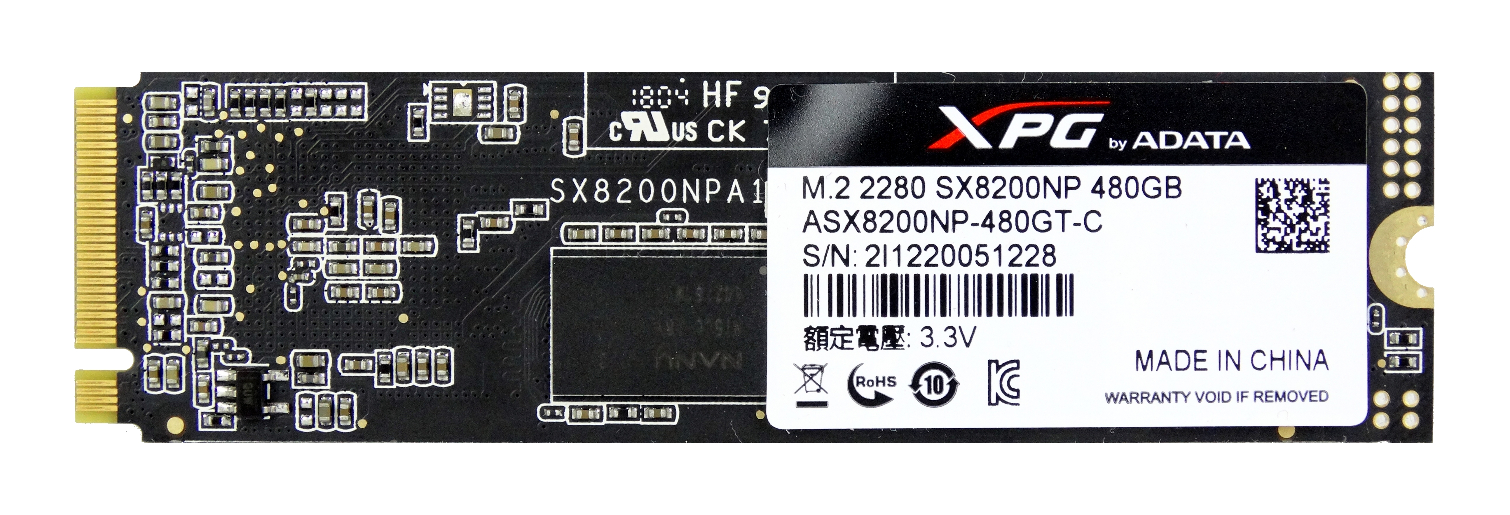Tom's Hardware Verdict
Premium 256GB-class SSDs are hard to come by in the post-MLC era. The 240GB Adata XPG SX8200 makes the best of the commodity components available to increase performance under more demanding workloads. This isn't a pure workstation-class SSD, but gamers and most other users will benefit from the larger SLC buffer and appreciate the $99.99 price point.
Pros
- +
Strong consumer workload performance
- +
Low cost
- +
Two software suites
- +
Included heat sink
Cons
- -
Mainstream endurance
- -
Not a true workstation-class SSD
Why you can trust Tom's Hardware
Features & Specifications
The Adata SX8200 NVMe SSD is the best value in mainstream SSDs we've ever tested. Adata gathered all the right pieces to deliver a righteous user experience at prices that start at less than $100. For that price, you get a 240GB drive that is far superior to any SATA SSD and is likely twice as fast as your current drive.
Capacities Rated
64-layer 3D TLC flash is coming to SSDs across the board, so most new drives in 2018 will feature identical components. There are still some standout products with astronomical performance like the Optane and Samsung Pro Series, but while the waves they create are monumental, those products are far removed from most regular computer users.
That means the SSD companies have to survive by making their similar products look extraordinary. This year, the way to stand out in the mainstream SSD market is to maximize the value of commodity parts and provide the best value.
Adata already announced three SX8200 models in 240GB, 480GB, and 960GB capacities. We spotted a 2TB SX8200 drive on display at CES 2017, so larger models are likely on the roadmap.
The SX8200 delivers up to 3,200/1,700 MB/s of sequential read/write throughput, but the specifications don't show how much data you can write to the fast SLC buffer. We'll measure that shortly. Random performance reaches as high as 310,000/280,000 read/write IOPS. Performance scales with capacity, so the 480GB SX8200 is the only model that provides the highest performance in all four categories.
Adata chose Micron's 64-layer 3D NAND for this series. Adata receives wafers and bins its own flash so it can select premium flash for its SSDs and use the lesser flash in lower-performance products.
Features
Over-provisioning is "hidden" flash capacity the drive uses to spread data writes and erases across a larger population of NAND blocks. This increases the endurance and write performance of the drive in areas you don't see on the specifications sheet. This is important to know because it's the not-so-secret source of the SX8200's performance.
Get Tom's Hardware's best news and in-depth reviews, straight to your inbox.
Adata's SX8200 uses the same Silicon Motion SM2262 controller as the Intel SSD 760p and HP EX920, which are two competing SSDs we really like for both their performance and cost. The HP EX920 introduced a dynamic SLC buffer that grows (based on free capacity) to ingest incoming data, while the Intel 760p has a fixed buffer capacity. The Adata SX8200 also uses a dynamic buffer, but it also leverages its over-provisioning to boost performance.
Pricing, Warranty, And Endurance
Last August, we began to hear about affordable SM2262-based products coming to market, and we published details when they became available in January. Intel set the initial pricing tone with the SSD 760p, and then HP undercut that drive with the EX920.
Adata takes pricing another step lower with the SX8200. The 240GB SX8200 currently retails for as low as $99.99, and the 480GB model retails for $184.99. At the time of writing, we couldn't find the 960GB model online. We expect it to become available in the coming weeks as Adata builds larger packages stuffed with more Micron 64-layer NAND.
| Adata XPG SX8200 | 240GB | 480GB | 960GB |
| Endurance - TBW (Terabytes Written) | 160 TBW | 320 TBW | 640 TBW |
Adata matches the five-year warranty period of other premium NVMe SSDs. Like other SSDs, the warranty carries an endurance clause based on the amount of data you can write to the drive during the warranty period. Adata supports 160 TBW (terabytes written) with the 240GB SX8200 and endurance doubles with each capacity increase.
Software
Adata offers two downloadable software suites. Adata's custom SSD Toolbox enables SMART monitoring, secure erase, TRIM functions, and other miscellaneous features. Adata also provides a trimmed version of Acronis. The software allows you to clone data from an existing drive to the SX8200. This is a nice feature that allows you to install the drive without the hassle of reinstalling Windows and all your software.
A Closer Look
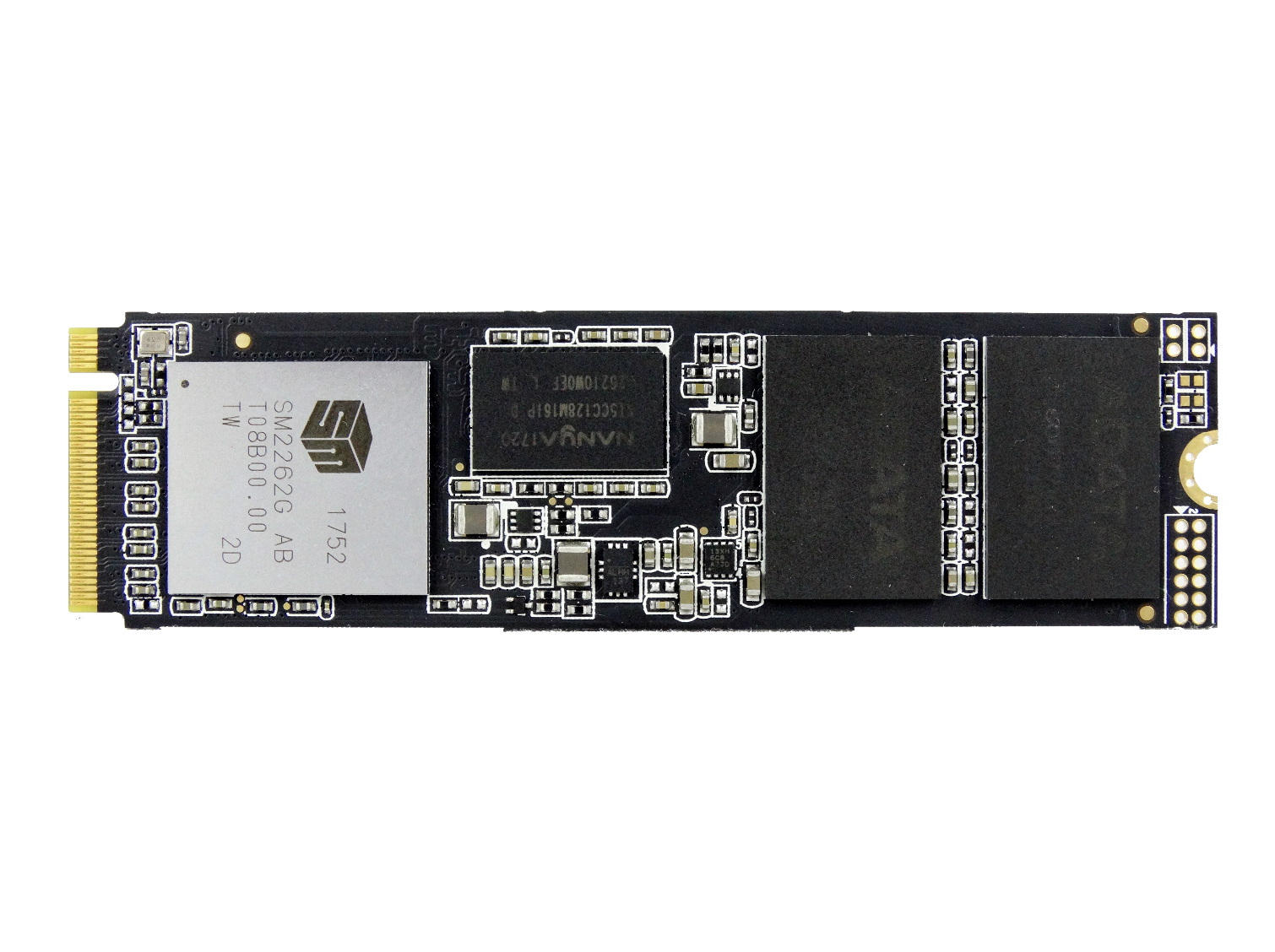
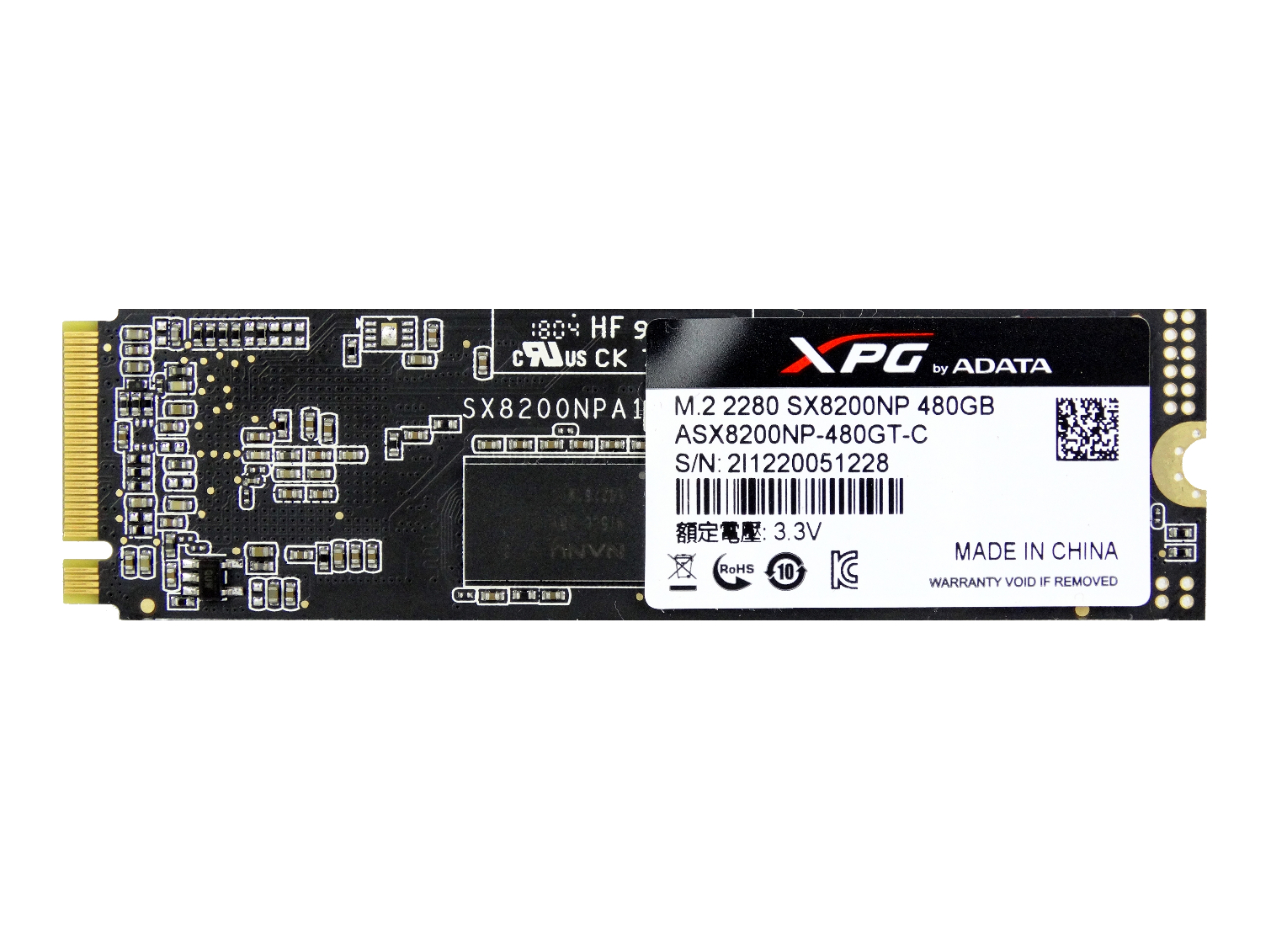
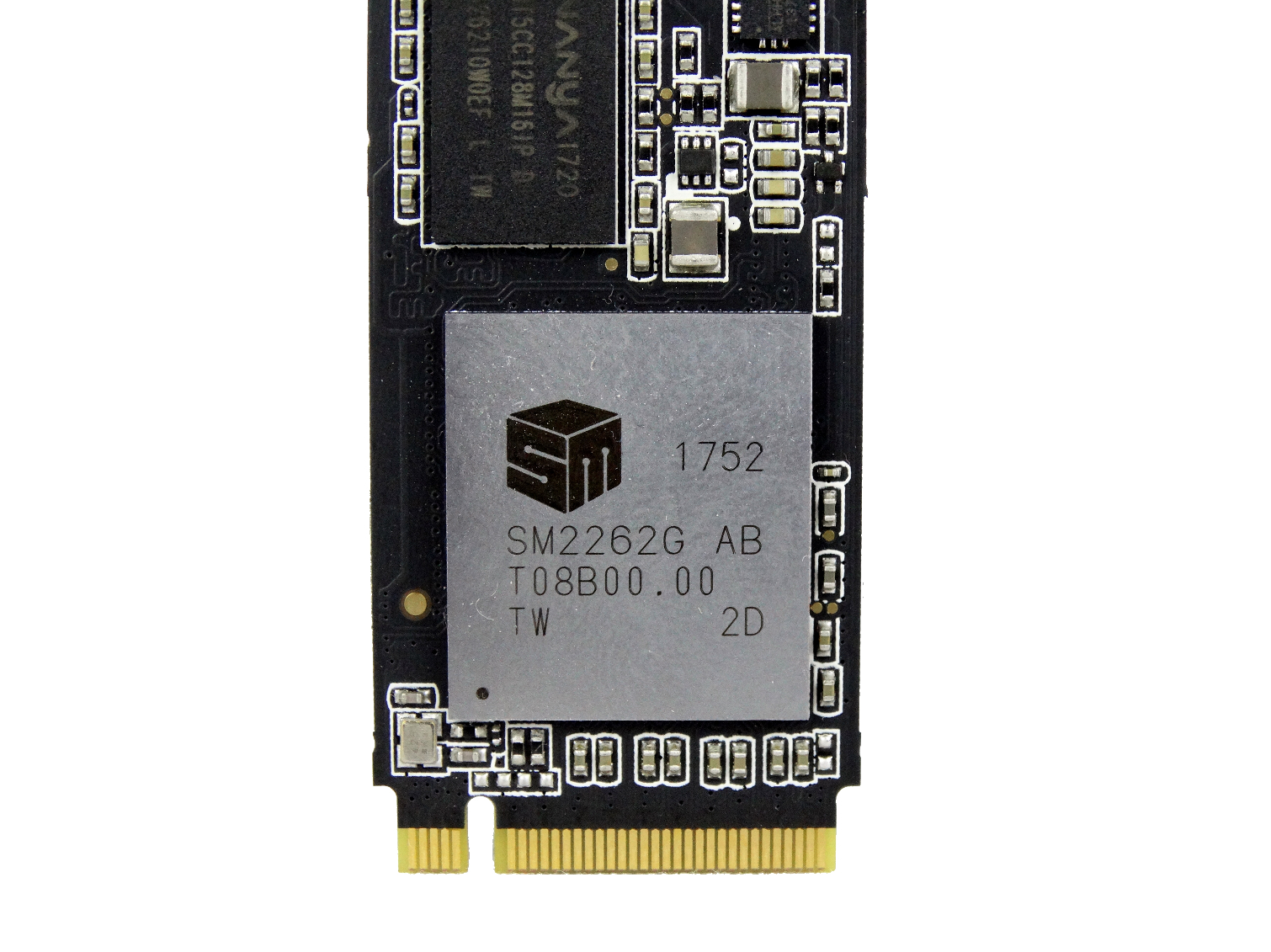
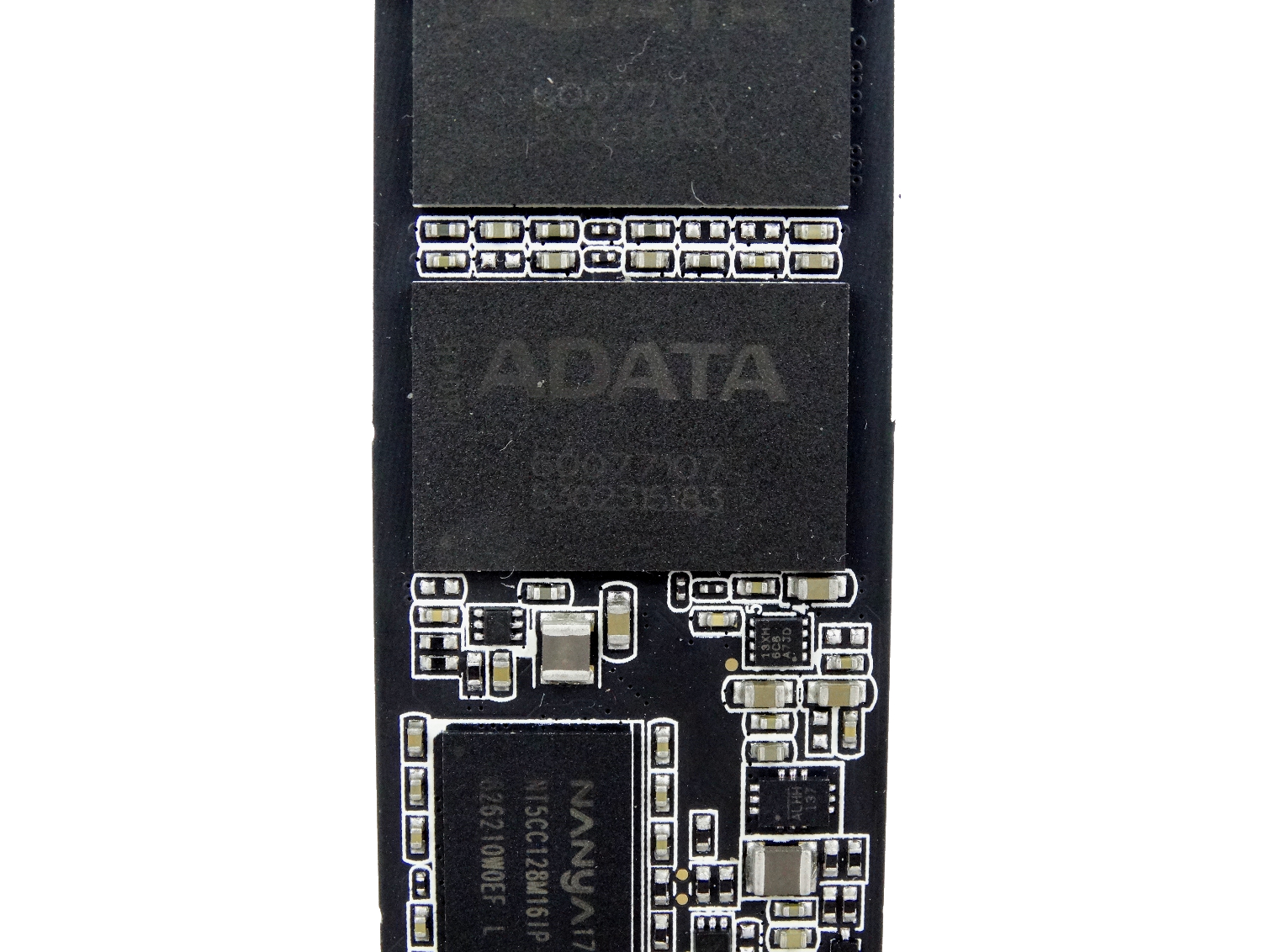
On the surface, the drive is essentially a reference-design SM2262 SSD. Adata's custom work went into sorting the flash and enhancing the firmware. All capacities come with the double-sided form factor that now enjoys broad support.
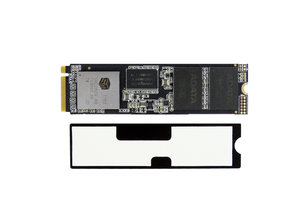
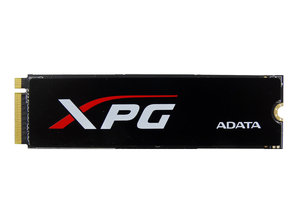
The XPG-branded heat sink is one feature that Adata did not pull straight out of Silicon Motion's reference design playbook. Adata includes a thin metal plate with thermal transfer tape already applied. The plate acts as a heat sink by distributing the heat from the controller to a larger surface area. You don't have to put the heat sink on, but the SSD looks a lot cooler when you do.
Specifications
| Row 0 - Cell 0 | Adata XPG SX8200 (240GB) | Adata XPG SX8200 (480GB) | Adata XPG SX8200 (960GB) |
| Capacity (Raw / User) | 256GB / 240GB | 512GB / 480GB | 1024GB / 960GB |
| Form Factor | M.2 2280 D5 | M.2 2280 D5 | M.2 2280 D5 |
| Interface / Protocol | PCIe 3.0 x4 / NVMe 1.3 | PCIe 3.0 x4 / NVMe 1.3 | PCIe 3.0 x4 / NVMe 1.3 |
| Controller | SMI SM2262 | SMI SM2262 | SMI SM2262 |
| DRAM | Nanya DDR3 | Nanya DDR3 | Nanya DDR3 |
| NAND | Micron 64-Layer TLC | Micron 64-Layer TLC | Micron 64-Layer TLC |
| Sequential Read | 3,200 MB/s | 3,200 MB/s | 3,150 MB/s |
| Sequential Write | 1,100 MB/s | 1,700 MB/s | 1,700 MB/s |
| Random Read | 200,000 IOPS | 310,000 IOPS | 310,000 IOPS |
| Random Write | 240,000 IOPS | 280,000 IOPS | 280,000 IOPS |
| Encryption | ✗ | ✗ | ✗ |
| Endurance | 160 TBW | 320 TBW | 640 TBW |
| Product Number | ASX8200NP-240GT-C | ASX8200NP-480GT-C | ASX8200NP-960GT-C |
| Warranty | 5-Years Limited | 5-Years Limited | 5-Years Limited |
MORE: Best SSDs
MORE: How We Test HDDs And SSDs
MORE: All SSD Content

Chris Ramseyer was a senior contributing editor for Tom's Hardware. He tested and reviewed consumer storage.
-
dudmont Hurray for us! Does the Adata software include a custom driver? If not, has the stock Windows driver been improved? I seem to recall(this is old, I know) that intel and samsung's custom drivers(960 not 970) added a bit to performance and where is the industry, in general, on this topic?Reply -
davidgirgis 240GB Verdict/Score Box is on Page 2: 512GB Performance Testing.Reply
480GB Verdict/Score Box is on Page 3: 256GB Performance Testing.
It should be the other way around. -
richardvday Why are you calling it an SSD instead of NVME ?Reply
Some of us can not use NVME drives yet and need an actual SSD still. -
nukemaster Reply
because it is an SSD.20992560 said:Why are you calling it an SSD instead of NVME ?
Some of us can not use NVME drives yet and need an actual SSD still.
NVME vs SATA are interfaces(standards).
kind of like how IDE was replaced with SATA years back. For the time, they still have quite a few SATA SSDs to choose from. -
mdd1963 "Some of us can not use NVME drives yet..." Then buy one of the standard 2.5" SATA SSD models :)Reply -
mikewinddale "SSD" means "solid-state disk," meaning it uses flash memory instead of spinning mechanical disks.Reply
"NVMe" is a logical interface, meaning it is a communication standard. (Personally, I'd call it a protocol.) That means it is not a physical standard, but rather, it dictates the terms of data being communicated.
"AHCI" is also a logical interface. It is what NVMe replaces. NVMe can be implemented on PCIe, while AHCI can be implemented on both PCIe and SATA.
SATA and PCIe are both bus interfaces. So that means they dictate physical connections and electrical standards. Again, the SATA bus will be paired with the AHCI logical interface, while the PCIe bus can be paired with either the AHCI or NVMe logical interfaces.
So any SSD can come in 3 types:
(1) SATA with AHCI
(2) PCIe with AHCI
(3) PCIe with NVMe
#2 was short-lived. A few PCIe drives were released before NVMe was released. Hence PCIe with AHCI. But now virtually all SSDs are either #1 or #3. -
mapesdhs "This is a nice feature that allows you to install the drive without the hassle of reinstalling Windows and all your software. "Reply
Or just use something like Macrium Reflect Free, works fine. -
AgentLozen Replyadata-xpg-sx8200-article said:The lower random read performance takes its toll on application workloads. The SX8200 trails several of the other products during some of the lighter workloads, but it performs better during the heavier workloads.
This is the paragraph describing the real world software performance. The author includes a bunch of juicy details about the xpg 8200 trailing or leading other SSDs in performance. The differences between SSDs here are exaggerated though. If you study the charts, you'll see that every SSD listed performs exactly the SAME.
The truth about real world performance is that you're better off using an SSD than you are a mechanical hard drive. There's nothing else to analyse. -
Brian_R170 My worry is reliability. AData products always seem to have great prices, but I have had such bad luck with their products (memory, SSD, USB Flash) failing over the years that I won't even consider them any more.Reply -
BaRoMeTrIc Reply20993496 said:My worry is reliability. AData products always seem to have great prices, but I have had such bad luck with their products (memory, SSD, USB Flash) failing over the years that I won't even consider them any more.
Its a matter of luck more than anything. Ive had the same adata ssd in my plex server for 3 years now, and we're talking HEAVY caching, probably close to 2,000 transcodes and constant updates or previews and thumbnails.But ive never had an issue with it. My corsair nuetron XTI drive that i paid big bucks for failed after 6 months (phison controller) MydigitalSSD BPX nvme failed after 3 months (phison controller) both of those drives were rather expensive, compared to my adata, and were under far less strenuous workloads. It all just boils down to luck of the silicon. That being said i will never in a million years buy another product with a phison controller.
